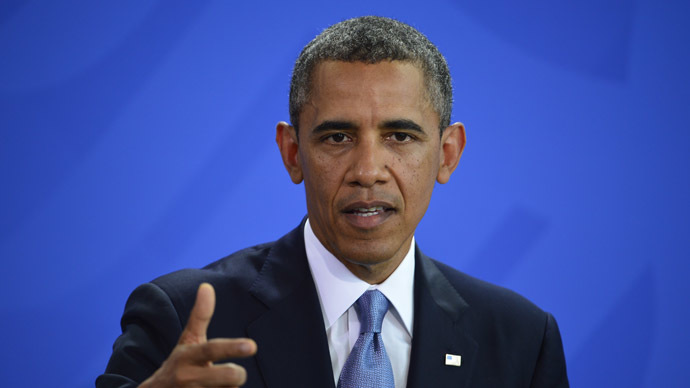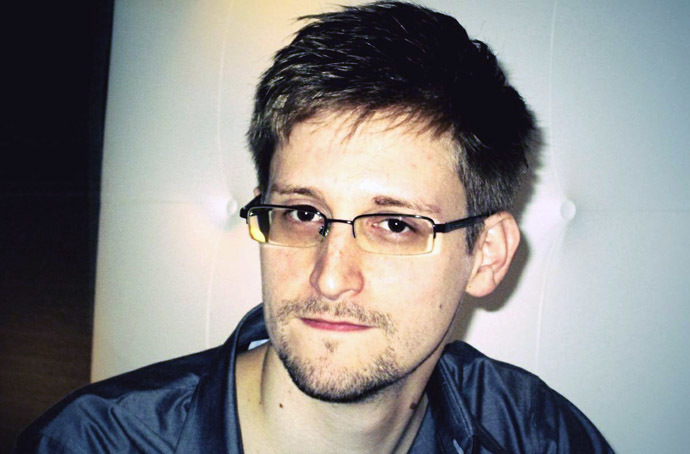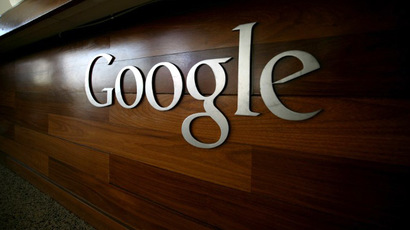Damage control: Obama meets with privacy board amid NSA scandal

United States President Barack Obama is convening with a rarely assembled privacy and civil liberties board Friday in the wake of a series of scandals centered on his administration’s surveillance of US citizens.
In light of the revelations made earlier this month by former intelligence contractor Edward Snowden, Mr. Obama is meeting Friday with the Privacy and Civil Liberties Oversight Board, an independent agency within the executive branch that has only met previously with the president once during his four-and-a-half years in the White House.
Obama will speak with the oversight panel in Washington and is bringing along James Clapper, the director of national intelligence, as the discussion is expected to focus on the US government’s collection of phone and Internet records.
“Obama is specifically asking Clapper to review possible declassification of opinions from the Foreign Intelligence Surveillance Court, which approves the surveillance efforts,” the Associated Press reported.
The court, established under the Foreign Intelligence Surveillance Act of 1978, has the authority to compel telecommunication companies for the personal information of any user, American or other, in the name of investigating criminal matters. Those orders are done with questionable oversight, however, and are filed and delivered in secrecy. Gag-orders prevent telecoms from telling customers that their records are sought, and The Guardian newspaper published a leaked copy of one of those requests on Friday to show that a single paragraph is all that’s issued to demand the data.
A FISA judge simply “declares that the procedures submitted by the attorney general on behalf of the [National Security Agency] are consistent with US law and the Fourth Amendment,” The Guardian reported earlier this week.

The FISA orders have taken center stage in the media this month after The Guardian began publishing top secret documents two weeks ago exposing the NSA’s practices of accumulating troves of intelligence on US persons using the secret court requests. President Obama and his administration’s leading intelligence officials have adamantly defended the program and have called the surveillance a necessary implement in the war against terror that comes at the cost of what the White House says is only a minor sacrifice of privacy in the name of security.
“I came into office committed to protecting the American people but also committed to our values and our ideals and one of our highest ideals is civil liberties and privacy,” Obama said earlier this week “I am confident that at this point we have struck the appropriate balance.”
The president’s critics say otherwise, though, and his administration was sued earlier this month by the American Civil Liberties Union on allegations of constitutional violations. The ACLU says that the supposed safeguards meant to protect privacy are not adequate and that the surveillance practices break laws established through the First and Fourth Amendments.
Thomas Drake, a former NSA employee who resigned during George W.
Bush’s term in office after voicing concern over the surveillance
practices, told RT in a conference call this week that “The
oversight is simply an artificial mechanism to give the
appearance of oversight.”
“They’ve basically unhinged themselves from the Fourth Amendment of the Constitution,” Drake said of the administration.
But while the White House continues to attest otherwise, Mr. Obama’s meeting with the oversight board on Friday is prompting allegations that his administration is simply attempting to conduct damage control. Although the board was established in 2004 in the wake of new practices established following the terror attacks of September 11, its members have convened sparsely since.

“The board was dormant during Obama's first term and only became fully functional in May, before the NSA programs became public,” the AP reported.
Last year, Mark Jaycox of the Electronic Frontier Foundation acknowledged that the board had been silent for half of a decade but said the Obama administration seemed to be heading in the direction of finally employing the panel.
“The PCLOB could bring much needed transparency to government surveillance actions, legal analyses and procedures. Not only can the board report to the public and recommend revisions to current laws and policies, but it can also ’continually review’ the implementation and creation of policies by issuing proposed corrections and admonitions— all while consulting with the public,” he wrote.
A meeting of the board on Wednesday this week marked the first time the five-person agency has held a full-fledged meeting since the Senate confirmed David Medine as its chairman in May 2013.
According to Reuters, Medine hopes the board will hold a public event next month “to get legal insight from experts, academics and advocates” about the surveillance practices.
"Based on what we've learned so far, the board believes further questions are warranted," Medine told Reuters.
"The president's direction is that as much information as possible be made public while being mindful of the need to protect sources and methods and national security,” the White House said this week.














